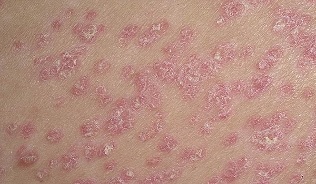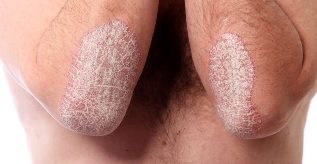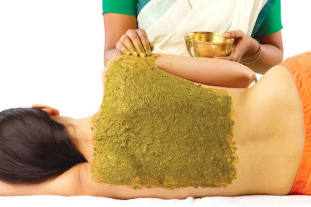Faced with Psoriasis, many patients are not immediately recognizable pathology, take your allergic skin rashes Dermatitis and some others. For the timely diagnosis of diseases, it is important to know how the pathology, what are the stages of Psoriasis and symptoms of the disease in various stages. The course of Psoriasis is characterized by four phases, which distinguish initial, Progressive, stationary Phase, and a Phase of the return to education. In Detail you look at each Phase in the article.
The beginning stage of psoriasis

Many patients are interested in how psoriasis looks in the early stages? The first symptoms of the disease you can see on the photo. For this Phase characteristic development on the skin red, pink spots with clear boundaries characteristic. The disease can occur in different parts of the body. More photo-pathology granted to different areas of the body.
Symptoms of psoriasis in the early stages
For the initial phase of the disease is characterized by the following symptoms:
- a slight detachment of the Dermis;
- Redness of the skin;
- the development of the itch;
- a feeling of dryness, tightness;
- the formation of spots of different diameters;
- a step-by-step reinforcement of the shell.
The clinical picture of the pathology may vary depending on the nature of the disease. So, in the case of Psoriasis in the Form of drops, the size of the Plaques, a narrow diameter, not more than 2 — 3 mm. The most common Form, is vulgar, rashes is of considerable size, more than 5 cm to reach, often merge together, forming large lakes. For pustules Psoriasis tend to the formation of crusts on the leather skin yellow or greyish tint with the accumulation of serous fluid under them.
The first Phase takes in each patient differently. It depends on the type, the immunity of the patient, and other characteristics of the organism.
The treatment of the initial phase
For the first stages of the disease prescribe is the most common local treatment of the lesions with the use of ointments, gels, lotions. The drug therapy aims at the elimination of itching, scaling, swelling, redness, inflammation. The hormonal and non-hormonal ointment.
Hormonal medication in the early phase is rarely prescribed. Often their use in patients shown to be acute in the course of the pathology.
Hormonal ointments often cause side effects. Use is recommended only on doctor's prescription.
Progressive stage of Psoriasis

Progressive Phase is characterized by the symptoms of the disease, Plaques becoming larger and larger, itching, flaking, swelling, inflammation increased. Rashes will start to merge with each other, hitting the major areas of the Dermis. In the stage of progress often such a Symptom as the phenomenon kebnera appears. The essence of the phenomenon lies in the fact that the new rash appear at the places of damage to the skin. If the scratches on the skin, abrasions, burns, appear in their place, with great probability of Plaques. The duration of the stage of progress, on average, lasts from 14 days to several months. For each patient, this period of time depends on the individual peculiarities of the organism and how quickly the immune system to cope with the pathology.
The treatment of the advanced stages of the
Acute Psoriasis requires a comprehensive approach with the following techniques:
- The drug treatment.
- The use of physiotherapy.
- Correction of the life style of the patient.
Important! The tactics of treatment is defined individually for each patient, depending on the severity of the disease, its course and characteristics, the presence of complications.
Drugs
For the liberation of Plaques and reduction of symptoms in medical practice uses the following groups of drugs:
- Antihistamines – calculated to reduce such symptoms, such as itching, redness.
- Sedative medication systems, excessive nervousness, to normalize sleep.
- Anti-inflammatory drugs – reliable process to relieve the inflammation, help remove redness, and other signs of the disease.
- Diuretics – medications, the the excretion from the body excess fluid and salt. Such medicines help cleanse the body, what is a positive effect on the course of the disease.
- Keratolytic – promote good exfoliation of the Epidermis, the Regeneration of the Dermis, your Update.
- Immune modulators – regulated the immunity of the person, which is an important prerequisite for the recovery.
- Hormonal ointment give quick results, mainly in the case of serious diseases.
- Cytotoxic drugs have the characteristic of being suppress the immune system, it is sometimes necessary for the liberation of psoriatic Plaques.
All medications should be only after the doctor's appointment. Self-treatment for pathology.
Physiotherapy Treatment
Among the methods of physical therapy:
- PUVA therapy;
- The use of ultrasonic irradiation.
- Magnetic field therapy.
- Selective Therapy.
- The laser beams.
- The Mud Cure.
- Paraffin baths.
- Spa-Treatment.
The number of sessions and the duration of which the doctor takes into account the characteristics and nature of the disease, as well as the personal characteristics and the General health of the patient.
Traditional Methods

From the therapeutic methods recommended:
- Natural oils (juniper, or lavender). A healing and calming effect, a positive effect on the condition of the skin. Type of application: a few drops of oil, add in the cream and to selectively apply on the rashes.
- Hydrogen peroxide (3%). Selectively applied and not washed off. Prior to the application, you need to consult with your skin doctor.
- 30 G of Propolis Mix with 250 ml of vegetable oil (oil, boiled). The prepared mixture must be applied for the dissolution of keratinized layer of the Epidermis and restore the elasticity of the skin.
- Bees wax. This product has an anti-inflammatory and softening effect. Bees wax melt must insert in a water bath, and then gently apply on the bark, the papules.
- Med. The main product of the bees has a positive effect on the human body in Psoriasis. It must be consumed in limited quantities – 2 tablespoons per day.
Tincture against psoriasis
From the methods of treatment of the same oils and hydrogen peroxide.
To it it is possible to make a tincture on the Basis of celandine. For the preparation you will need 3 tablespoons of this plant (dry or fresh) and salt water. In any case, do not use alcohol as this will dry the skin.
How to cook cure:
- the components to mix;
- leave for a few hours.
Prior to the application of the tincture of the skin ointments recommended birch-tar (dot), the reinforce healing effect.
The therapy is effective, the Patient should go on a diet diet, the harmful products of provoke exacerbation of the condition.
Diet for psoriasis

Patient, the psoriasis, it is important to adhere to proper nutrition. The diet allows you to clean faster, the skin of the Plaques, preventing the complication of the disease.
Principles of diet therapy the following:
- Not recommended is the spicy, salty, sour, fried food. Such products are only the growth of Plaques increase.
- The diet should be full of a lot of vegetables, fruit.
- In the role better main dish to choose, porridge, soups, lean meat and fish.
- On the table, no products of all genes. You need to give up eggs, nuts, chocolate, citrus fruits.
- Drinks with caffeine are also excluded.
- Alcohol, carbon dioxide prohibited carbonated beverages.
- Dairy products should not contain fat. Preference of plain yogurt, Kefir, sour milk.
Eat it is recommended, in small portions, and avoid overeating. The diet is an important part of the therapy of the disease. Proper nutrition helps to saturate the body with vitamins, rid of waste products and toxins.
Stationary Phase
The stationary Phase is due to a decrease in the growth of psoriatic Plaques, and their number is not on the body is reduced, the disease in the sleep mode. In the presence of the pathology triggering factors of stationary again on the stage of the progress. The causes of this phenomenon is the poor treatment, the refusal of observance of the diet, injury to the skin. The duration of the stationary Phase is different in different patients, that it was very difficult to assume also its limits. On average, it takes a time of several weeks to several years.
Phase of the Regression
Phase of the Regression is the last stage before the Remission of the disease. Here there are the following changes:
- The color of the papules of bright red in the pale, pink hue.
- The number of flaking is reduced.
- Go Away Itching.
- The skin is cleaned, wins smooth tone and structure.
- It will remain on certain areas of the body, so-called "duty Plaques". Such rashes don't completely go away on the skin even in Remission.
Psoriasis belongs to a chronic Dermatitis that is not contagious in nature. Complete pathology is not to get rid of to the present day. Patient, the pathology, you have a whole life to keep preventive measures for the prevention of relapse. Many patients succeed in Remission for many years, a fulfilling life.

























